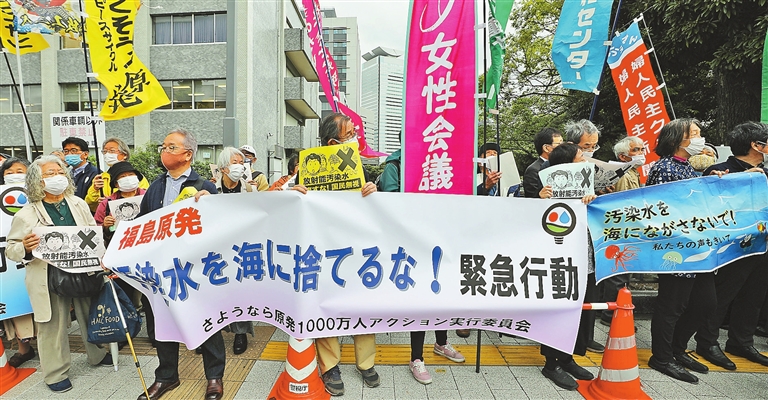
JAPANESE Prime Minister Yoshihide Suga said yesterday that his government has decided to discharge contaminated radioactive wastewater in Fukushima Prefecture into the Pacific Ocean amid domestic and international opposition. Suga made the announcement after convening a meeting of relevant ministers to formalize plans to release the radioactive water accumulated at the plant into the sea. Struck by a magnitude-9.0 earthquake and ensuing tsunami that hit Japan’s northeast March 11, 2011, the No. 1-3 reactors at the Fukushima Daiichi nuclear plant suffered core meltdowns. The plant has been generating massive amount of radiation-tainted water since the accident happened as it needs water to cool the reactors. The plant’s operator Tokyo Electric Power Company Holdings Inc. (TEPCO) said it will take around two years for the release to start. The water has been treated using an advanced liquid processing system, or ALPS, to remove most contaminants. However, things like tritium, a radioactive byproduct of nuclear reactors, are hard to filter out. According to some marine experts, traces of ruthenium, cobalt, strontium and plutonium isotopes in the wastewater also raise concerns. The plant has been struggling to store the contaminated water in tanks at its facility where more than 1.25 million tons of such water are currently stored in huge tanks, and the space is expected to reach capacity next year. TEPCO claimed that the whole decommissioning process will be hampered if it needs to keep building storage tanks within the plant’s premises. Japan had considered evaporating or storing underground the tritium-laced water from the plant as an alternative. However, from the perspective of cost and technical feasibility, the Japanese Government decided to dilute the contaminated water and discharge it into the sea. The plan has been facing strong opposition from the Japanese fishery industry and the public, with industry representatives saying it would undo years of work to restore their reputation. “We are dead against a release of contaminated water to the ocean as it could have a catastrophic impact on the future of Japan’s fishing industry,” Hiroshi Kishi, head of the national federation of fisheries cooperatives known as JF Zengyoren, told a meeting with government officials last October. According to Kishi, the release of radioactive water could trigger other countries to tighten restrictions on imports of Japanese fishery products, reversing a recent trend toward loosening. Currently, a number of countries and regions continue to impose restrictions on Japanese agricultural and fishery products as a result of the Fukushima crisis amid continued concerns about the safety of the produce. During a meeting with Suga last week, Kishi reiterated his organization’s ardent opposition to the idea of dumping the radioactive water into the sea. “It is inevitable that there would be reputational damage regardless of how the water will be disposed of, whether into the sea or into the air,” he said. “I want the government to clarify how it intends to respond to such reputational damage.” Japanese Economy, Trade and Industry Minister Hiroshi Kajiyama said Friday that while working on the concerns of the fishery industry, the government hopes to seek cooperation of the International Atomic Energy Agency (IAEA) and other global organizations, while maintaining transparency over the matter. The Japanese Government had initially hoped to make a decision on the release of the water last October. However, it delayed the decision due to fierce opposition from local fishermen. China yesterday urged the United States to treat Japan’s decision to dump the radioactive wastewater according to the facts, rather than according to the country that would make the move. Foreign Ministry spokesperson Zhao Lijian made the remarks at a press briefing in Beijing when commenting on the United State’s recently declared stance that Japan’s decision has been “transparent,” and “appears to have adopted an approach in accordance with globally accepted nuclear safety standards.” A commentary by China Daily pointed out that it the unanimous tolerance of Western politicians and media outlets toward Japan’s decision has laid bare their double standards. Their silence on this forthcoming man-made environmental disaster speaks volumes about their hypocrisy, when the lives and health of the people in the Asia-Pacific region will be severely endangered and the regional fishing industry will be dealt a deadly blow, said the commentary. As a signatory to the United Nations Convention on the Law of the Sea, Japan is obliged to protect its marine environment. According to the convention, signatory countries should not, directly or indirectly, dump substances into seas and oceans that could harm or likely damage the ocean’s bio-system.(Xinhua) | 
